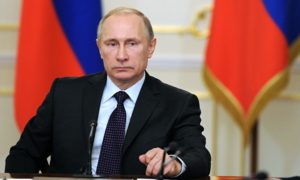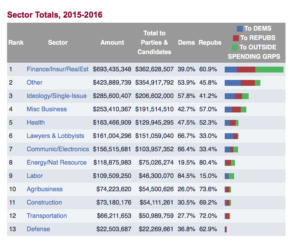Since the beginning of the semester we have been exploring two related processes: on the one hand, the unproblematic expansion of capital throughout the world, and, on the other hand, the somewhat more problematic proliferation of market distortions globally as pockets of resistance emerge in the face of global integration. Our models predict that this combination of forces inevitably give rise to political extremism. Two stories from the BBC this week, one from Turkey, the other from the US, bear testimony to this increasingly common outcome.
The first story (see below), features a mother and daughter. The mother describes how she fled to a uniformly European American community in Georgia to escape the diverse communities by which she feels threatened. The daughter, by contrast, describes her attraction to the variety of languages, cuisines, cultures, and experiences she has encountered at university.
The second story (see below), features a left-leaning scholar in Turkey who fell afoul of authorities in the restored Erdogan regime following last years attempted coup. Turkey reminds us of the enduring legacy of capital’s expansion in the 19th century, but also of the strained transfer of global dominance from Great Britain to the United States that began in the early 20th century and completed itself following World War II.
Our model shows how capital expands most efficiently where particularities — e.g., purely local or regional laws, regulations, customs, and practices — are either eliminated or trivialized. Most familiar is will be the process whereby an imperial power — France, England, Holland, Spain — cultivates relationships with indigenous oligarchs who collaborate to bring local laws, regulations, customs and practices into better alignment with the requirements of capital expansion for the imperial power. While this is never a smooth process, it eventually gives rise to a colony groomed, under post-colonial conditions, to participate more or less transparently in the networks of trade familiar to us throughout the post-colonial world. The process itself almost always entails the suppression and often the elimination of those segments of the colonized population reluctant to shed their particularity and whose resistance, therefore, imposes constraints on capital expansion. Still, the very process itself whereby purely local or regional social forms are eliminated often strengthens oligarchic political forms which can themselves stand in the way of efficient markets.
But it is precisely here that we need to identify a valuable distinction between the initial resistance offered by communities shaped by pre-imperial social and cultural forms and ongoing resistance offered by communities shaped entirely by the novel social forms introduced by the colonizer. When we listen to the mother who has fled to Georgia to live among her own people and escape from the flood of non-European Americans, we are clearly listening to a hybrid resistance narrative. Optimally, capital expansion eliminates or trivializes particularity, either rendering non-European Americans indistinguishable from their European American counterparts, or simply trivializing the differences; reducing these differences to food, clothing, and sanitized personal interest spots. This trivialization is evident in the cosmopolitan daughter’s embrace of what we are here calling “sanitized” difference. The mother, by contrast, feels victimized by a capital expansion among whose visible consequences has been the attraction of non-European Americans to shores that she (mistakenly) identifies as her own. In other words, our model makes room for both the mother’s xenophobia and the daughter’s cosmopolitanism, each of which are normal, expected responses to capital expansion and global integration.
And, yet, clearly the two responses are not equivalent. In the daughter’s response, global integration and capital expansion are experienced as positive processes that bring the world closer together. Politically, therefore, it makes perfect sense that the daughter would favor Hillary Clinton. The mother, by contrast, experiences global integration and capital expansion as threats. Does this mean that the mother might have supported Bernie Sanders? Yes, but only if she enjoyed a more realistic understanding of the mechanisms that have made her a victim. In that case, she might have recognized her common cause with the non-European Americans expelled onto the shores of North America, who, with her, are equally victims of capital expansion and global integration. Instead, she is brought to credit her victimization to the very surface phenomenon celebrated by her daughter — purely cultural, linguistic, or genetic differences, which she is then encouraged to credit for her insecurity. Judged analytically, of course, the role she ascribes to culture, language, or race is without foundation. And, yet, her fixation on these surface expressions ought not for this reason be judged arbitrary.
Surprisingly, globalization and integration are themselves implicated in her fixation. Capital does not expand evenly. Purely local and regional walls are erected or reinforced to protect or advance interests that capital expansion threatens. So, for example, local, regional, and national oligarchs in Mexico needed to be brought on board in order for the North American Free Trade Agreement (NAFTA) to enjoy success. Similarly, had labour been among the factors freely traded throughout the Americas, not only would this driven down wages for documented workers in the US and Canadian (while raising wages for workers in Mexico), but it would almost surely have reduced the comparative advantages capital would have enjoyed relocating to Mexico and reduced the rent US employers enjoyed hiring undocumented workers. By restricting the free movement of labour, the architects of NAFTA ensured that public attention would fix on those superficial differences — the particularities — singled out in the enabling act itself. An undocumented laborer from whom an employer receives the same amount of labor for one third the cost, in effect earns rent on the undocumented laborers’ ethnicity while expanding the untapped supply of documented workers whose resentment against undocumented workers can be leveraged into expanded rent-seeking. Here, by design, ethnicity is made the target of income and employment disparities.
But that is not all. By casting a blind eye international differentials in environmental, occupational safety and labor organizing protections, regulatory regimes (such as NAFTA) that promote capital expansion also sweeten the pot for investors interested in relocating to regions whose weak labor, environmental, workplace safety laws tip the balance in their favor. Here again, capital flies under the radar while purely surface characteristics are placed front and center stage. Capital expansion and rising focus on particularity are not two separate isolated processes, but are both part of a single, highly differentiated, yet integrated process.
The process unfolding in Turkey is not altogether different. On the surface President Erdogan is seeking to eliminate the Islamist particularities promoted by his arch-nemesis, the the exiled Muslim cleric Fethullah Gulen. And, yet, this fails to explain why so many leftist secularists were swept up in the state crackdown following last July’s failed coup.
Ideally, market efficiencies would have made their own case in the Mediterranean basin, gradually winning converts among members of communities impressed by the freedoms enjoyed by their neighbors until, at long last, all communities would willingly, on their own, have shed their purely local, regional, and national differences and embraced the universal form. This is the ideal. In fact, however, every purely local, regional, or national difference erects a wall and so imposes a distortion upon formally free, unrestricted market relations. The Ottomans and then Turks stood in the way of capital expansion and so found themselves the objects of British, Austro-Hungarian, and Russo-slavic interests. Turkish nationalism was the peculiar outgrowth of this international competition; a hybrid of Islam, nationalism, and modernism on an Afroeurasian peninsula that was increasingly integrated into the global system.
Our model suggests that Turkish modernizers would meet resistance from purely local and regional communities whose forms of social mediation were not yet dominated by capital. It also suggests that investors might find rent-seeking opportunities in the differences between those communities fully committed to globalization and those communities whose particularities mark them as objects of such rent-seeking. In Turkey, President Erdogan’s Justice and Development Party is only partly misnamed. While not bending fully in the direction of Islamic nationalism, Erdogan sought to bridge the growing rift between the modernizing “development” forces in Turkey and the culturally dominant, but economically dependent Islamists. Again, the increasing economic dependence of culturally conservative Muslims was not unrelated to the drive for economic development and integration promoted by President Erdogan’s party. Fethullah Gulen and the Hizmet successfully occupied the chasm separating the modernist and internationalist Justice and Development Party from the vast majority of Turkish Muslims. When the July coup failed, however, President Erdogan used the coup as an opportunity to eliminate not only Turkey’s more conservative Islamists, but also leftist and secularist elements of Justice and Development who were critical of President Erdogan’s purely cultural move to the right. These secularist parties opposed increasingly strict laws against the consumption of liquor and participation of women in business, politics, and law. In other words, President Erdogan’s crackdown positions him as a culturally conservative advocate of the capital expansion and global integration responsible for the economic dependence of large segments of Turkey’s Muslim majority.
In both the United States and Turkey therefore globalization and capital expansion has given local politics a distinctively sadomasochistic form. Citizens enthusiastically promote the very policies by which they have been victimized in exchange for the pleasure of inflicting pain on others. President Erdogan and President-elect Trump have proven themselves masters of this sadomasochistic political form. Yet, their mastery does not remove Fethullah Gulen or Hillary Clinton from suspicion. When globalization and capital expansion are promoted in their own right without regard for the welfare of communities harmed by this process, our model gives us every reason to anticipate conflict and political suppression. It cannot be otherwise.
When Jimmy Carter, Bill Clinton, and Barrack Obama joined Presidents Reagan and Bush2 to weaken or eliminate protections enjoyed by working families they strengthened both of these tendencies within globalization and capital expansion — both the elimination of difference and rent-seeking based on difference. In a truncated, distorted version of the standard model, only the elimination of difference is highlighted. In the more robust model we are adopting here, both the shedding of particularity and its simultaneous cultivation are brought to the fore, calling attention to the necessarily conflictual character of capital expansion itself. In this sense, capital expansion is by its very nature sadomasochistic, both in the US and in Turkey. In both cases it derives pleasure from pain.





